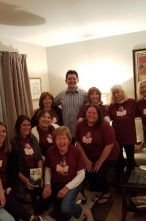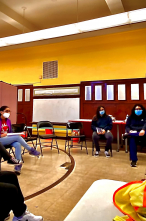The Laugh Cry
Have you ever belly-laughed and sobbed at the same time? I’m not saying laughed so hard that you cried. I’m saying laughed hard, from joy, and cried hard, from passion, at the same time. It took me forty-eight years to have the experience, but it finally happened. I was sitting at my desk, working, when my wife brought me a card from the day’s mail. It was from a teacher at Loyola Academy that I had recently met while presenting to some students at my high school alma mater.
Some of Loyola’s staff had asked me to come to the school and speak to a group of their freshman and sophomores. You see, throughout my high school career, I had a genuine dislike of all things related to reading and writing. To me, it was boring, difficult, didn’t really matter in the long run, and took up way too much time. Plus, there were easily a dozen other things I would rather do, like hang out with my friends, strum the guitar, watch t.v., play video games, or kick around a soccer ball.
I had the same general attitude throughout college, with the main difference being that, with so much freedom, the list of other things to do besides read and write was much longer in Champaign than it had been at Loyola. As my graduation from the University of Illinois got closer, I found myself in a precarious position. I would be graduating with a double major in Speech Communication and Philosophy. Perfect for a profession in…
I did what I figured any other college senior in my situation would do: I introduced myself to my college counselor and I asked her what I might do upon graduating with such an illustrious double major. I remember her saying, “I’ve only had one student of mine graduate with that same double major. She went to law school.” I recall my counselor’s tone carried a slight degree of skepticism in her response. She must have been looking at my GPA at the time.
Alas, given that I had nothing else going for me, law school was suddenly and undoubtedly the solution. True, I had never in my life desired to be a lawyer. True, it would put me in all kinds of financial debt. True, I would be competing against other men and women who excelled at my weakest attribute. But I had no idea what I wanted to do with my life and law school, at the very least, would keep my parents off my back. Plus, it would give me another three years of student life. The longer I could avoid the working world, the better.
Somehow (I’m still not sure how), in the fall of 1998, my application to the Chicago-Kent College of Law was accepted. It was shortly after beginning law school that I had my first dream of Samuel (https://thegiftofsamuel.com/the-glowing-man/). Thus began my dream journal that would slowly transform over the next twenty years into my first novel The Gift of Samuel: Grey Dawn.
During those twenty years, I did what I had to do to make ends meet. I worked for, and with, some great attorneys and successfully assimilated into my professional life. Still, my heart longed for something more. I was grateful to be gainfully employed, but something inside of me was empty, and the practice of law was not filling the void.
It was when I self-published my book that I anticipated the longing inside of me would finally be satisfied. I wanted others to be inspired by the message in the story, which was ultimately about choosing light over dark and holding onto hope in the face of despair. In my rational mind, if I could get just one reader to believe that light will always triumph over darkness, then I would have done my job, and that emptiness inside me would dissipate.
What I didn’t expect was one of the literacy specialists at Loyola Academy asking me to come into the school to share my journey with the students. I was someone that had hated reading and writing as a student, yet, I eventually became an attorney and author. I jumped at the chance to meet with the kids. I’d be one step closer to sharing the message of hope contained in the story, if I could get some of these young adults interested in my book.
My time with the students was magnificent but paled in comparison to what I found inside the card from them after our visit. Messages like “thank you for your inspiring words,” “thank you for sharing your life’s journey,” and “thank you for showing me how your life can change with a positive mindset” filled the card. As I read through the thank yous, it suddenly dawned on me: these were kids who were going to read my book, but, up to that point, had only read a tiny portion of it. They were finding hope in my own life’s story, not in the fictional story of Joshua Barratt as he trudged through Grey Dawn.
Then I came to the line that really got me – “thank you for showing us that one’s greatest weakness can grow to be their greatest strength.” My dream of making a difference in young adults’ lives was coming true, not from the message contained in my book, but in the fact that I pushed myself to write and publish the book. The longing inside me was finally being satisfied, in the most unexpected way. That’s when I put the card down and laughed, with the joy of realizing a dream, and cried, with thankfulness and humility, for the gift that these students gave me.


